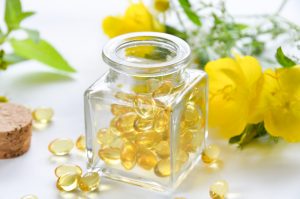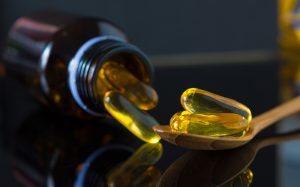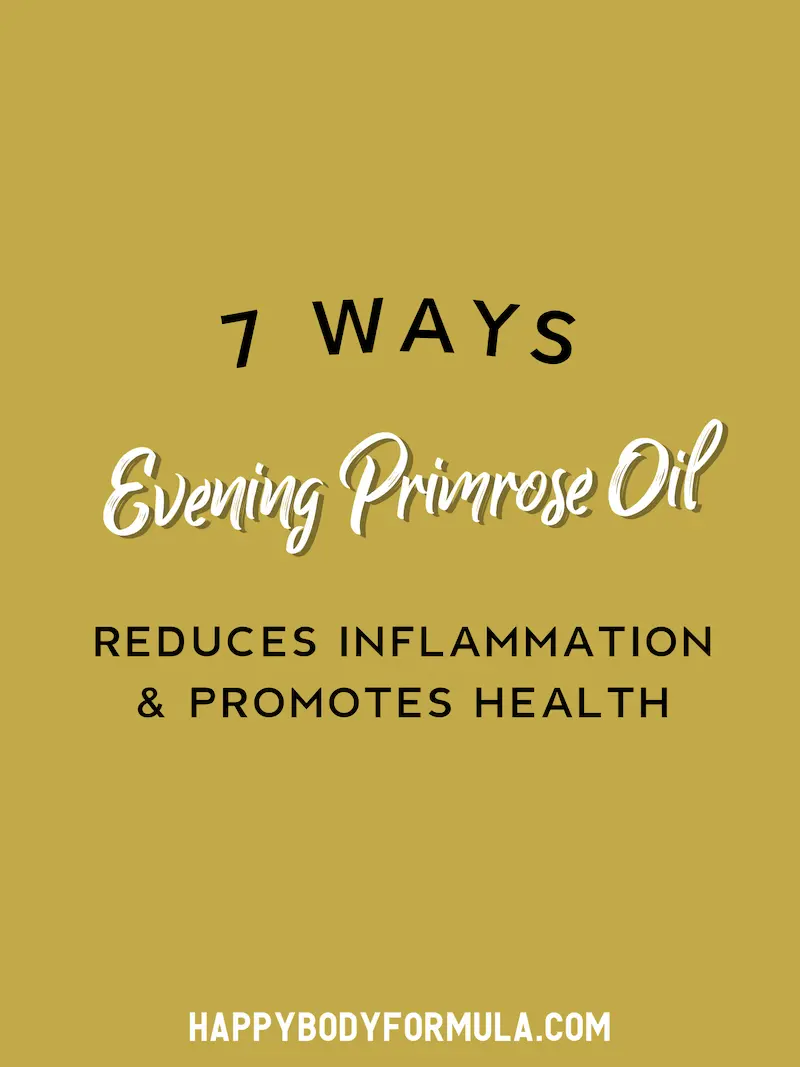
Evening primrose oil—EPO for short—is a plant extract that is commonly taken as a supplement. It is rich in gamma-linolenic acid, also known as GLA.
It is used for many different things, ranging from PMS relief to eczema to diabetes and beyond.
This article will explore the evidence-based health benefits of EPO along with information on how to take and cautions.
[toc]
What is Evening Primrose Oil?
Evening primrose oil comes from a flowering plant with yellow blossoms. It is named as such because the flowers bloom in the evenings. It was first used by Native Americans as a medicinal substance.
The plant is naturally found in Europe and parts of the United States and North America. It has been used for hundreds of years as a healing remedy for wounds and even hormone problems.
The oil extracted from the seeds of the plant is rich in GLA, which is beneficial for a variety of conditions. Evening primrose oil helps support healthy fatty acid ratios in the body.
The specific type of fatty acid found in EPO also fights inflammation both topically and internally.
Health Benefits of Evening Primrose Oil
Evening primrose oil has many health benefits. While it is frequently used for many reasons, these are the top evidence-backed ways that EPO can support health.
1. Alleviates Menopause Symptoms
There is mixed evidence for evening primrose oil and menopause. Some studies show no benefit, while others find that EPO can improve hot flashes relating to menopause, as well as other hormone-based symptoms like breast tenderness, mood swings, and even fluid retention or bloating.
While the results are mixed, some of the other health benefits—like supporting bone health—are applicable for women in menopause. More studies need to be done to effectively understand exactly how EPO can help menopause and provide natural relief for symptoms.
2. Addresses Eczema
Eczema is a complicated skin disorder that has roots in autoimmunity and inflammation. Research has not produced conclusive results, but oral and topical use for eczema could show promise.
Evening primrose oil might be beneficial for eczema because it can reduce inflammation in the body and help to promote fatty acid balance. In other countries, evening primrose oil is sometimes used as a prescribed treatment for eczema.
When using for eczema relief, EPO was taken orally for up to 12 weeks or used topically for up to four months. Before using anything topically, it’s always important to perform a patch test to ensure that a widespread allergic reaction or irritation won’t occur.
3. May Help Address Nerve Pain
Nerve pain is a common side effect of many conditions, including diabetes. The linolenic acid in evening primrose oil might be beneficial for addressing nerve pain symptoms such as numbness or tingling, weakness, and hot/cold sensitivity. (source)
Evening primrose oil has been found to be particularly successful at addressing nerve pain when other more conventional treatments have failed.
Typically, evening primrose oil taken for between six and 12 months can help to reduce pain and symptoms associated with nerve damage, especially when associated with diabetic neuropathy.
4. Treats Acne and Promotes Skin Health
Evening primrose oil has often been used as a natural way to treat and relieve acne, pimples, or other skin conditions. The fatty acids in EPO can help to promote healthy skin elasticity and firmness along with moisture.
It can be especially effective for acne because of its ability to reduce inflammation, with research finding that it is effective for reducing lesions and breakouts. (source)
It can be used both topically and internally to address acne and overall skin health needs.
5. Promotes Heart Health and Normal Blood Pressure
While more research is needed to fully understand and outline the benefits of evening primrose oil for heart health and blood pressure, it has promising benefits for heart health primarily due to its ability to reduce inflammation.
With more than 600,000 people dying each year in the U.S. from heart disease alone, continuing to find ways to benefit and treat this condition is a top priority.
EPO has even been shown to help balance cholesterol, although it’s not clear if it can prevent cholesterol from oxidizing—which is the primary way that cholesterol affects heart health.
Taking evening primrose oil for heart health can be beneficial, but research has not yet identified a specific, actionable dose. Follow your doctor’s recommendations or dosing instructions.
6. Supports Bone Health
Evening primrose oil can be used in conjunction with other nutrients to improve bone density and slow bone loss, especially in menopausal women.
It is most often paired with calcium, vitamin D, and fish oil for optimal benefits.
Research has not identified why EPO supports bone health on its own, but together with these other nutrients, it helps keep inflammation in check.
7. Relieves PMS Symptoms
There are many causes and triggers for PMS, but some research suggests that women who experience it worse have more sensitivity to the hormone prolactin.
The GLA found in evening primrose oil can help to reduce the sensitive effects of prolactin and the way that it can trigger PMS.
Other research has shown evening primrose oil to help reduce other aspects of PMS like mood swings, irritability, depression, bloating, and more. (source)
It’s also effective when paired with vitamin E and vitamin B6 for PMS relief.
Evening primrose oil might also be able to help with breast pain associated with menstrual cycle hormone changes. Studies show that it’s because EPO can block prostaglandins that trigger breast tenderness.
Evening primrose oil, when taken daily, can have this benefit. (source)
Conditions That Are Not Improved With Evening Primrose Oil
While evening primrose oil has some convincing evidence for certain health conditions, there are some that it is frequently touted for that is not backed by any level of research.
It should not be used as a general GLA supplement since it has several interactions (see below), and should not be used to treat or address any of the following conditions or disorders.
The following are unproven ways to use evening primrose oil:
- Asthma
- ADHD
- Arthritis
- Psoriasis
- Hepatitis B
- Liver cancer
- Chronic fatigue syndrome
- Diaper rash
- Dyslexia
- Pregnancy complications
- Induction of labor
- Rheumatoid arthritis
- Sjogren’s syndrome
- Ulcerative colitis
- Multiple sclerosis
- Alzheimer’s disease
- Dementia
- Infertility
How to Take Evening Primrose Oil

The recommended dose of evening primrose oil varies based on the product strength and suggested dosage. It’s important to check with your healthcare provider before starting evening primrose oil and to get a recommendation of product, dose, intake, and duration.
There are many evening primrose products available online and in health food stores, but many supplements contain extra ingredients or fillers that could change the way they work. Always buy from a reputable source and follow product instructions.
Choosing products that have little to no “inactive ingredients” is the best option, along with reading and understanding every other ingredient in the product. If you have questions on a product, ask your healthcare provider, pharmacist, or contact the manufacturing company.
Cautions, Side Effects, and Who Should Avoid Evening Primrose Oil
Evening primrose oil is generally considered to be safe, especially when it’s used for a short-term duration (less than four months). It has not been studied for long-term use and could be dangerous if taken for longer periods of time.
Some potential side effects associated with taking evening primrose oil include:
- Changed bowel patterns (such as softer stools)
- Stomach ache or nausea
- Headache
Because evening primrose oil is plant-derived, it can cause allergic reactions in rare cases. If you take EPO and experience rash, wheezing, difficulty breathing, or any other signs of an allergic reaction, discontinue use and seek emergency medical care immediately.
It can also cause allergic reactions if it comes into contact during the manufacturing process with other allergenic substances. Always read the label carefully and ask questions if you are not sure.
Evening primrose oil can interact with certain medications and other supplements. Do not take evening primrose oil if you take any of the following:
- Blood thinners or anticoagulants
- Aspirin or NSAID drugs (like acetaminophen or ibuprofen)
- Antiplatelet drugs
- Blood pressure medication
- Nattokinase
- Cytochrome P450 substrates
- Lopinavir, ritonavir, or any other medication or treatment for HIV
- Any other supplements for blood pressure
- Medication for seizures
- Phenothiazines or other medications for schizophrenia
- CBD oil
This is not a full list of possible interactions, so be sure to check with your doctor or pharmacist before starting evening primrose oil.
Stop taking evening primrose oil at least two weeks before surgery since it can increase the risk of bleeding. It should also not be taken within two weeks before or after receiving general anesthesia as this can increase the risk of seizures and complications.
While evening primrose oil has many benefits, using it incorrectly could make it a dangerous supplement. Always seek personalized medical advice before starting this or any supplement.
The FDA does not regulate supplements for safety, only for the claims that they make.
Evening Primrose Oil and Pregnancy
Another note of caution is that evening primrose oil is frequently used to help a woman’s body prepare for labor during pregnancy.
It is sometimes taken orally to help prepare and tone the uterus for delivery, and other times it is used topically or internally to help prepare the cervix (ripening the cervix and leading to dilation) or to massage the perineum to prevent tearing.
None of these uses are supported by research. In fact, research shows that none of these are effective and that their uses in pregnancy could be unsafe. EPO has actually been associated with slowing down the time to dilation and leading to longer labor along with complications.
It can potentially increase the risk of preterm labor in those who are at risk for other reasons and can be problematic for high-risk pregnancies. If taking shortly before delivery, it can increase the risk of postpartum hemorrhage or complications following a cesarean birth.
Always keep your OBGYN apprised of supplements you take during pregnancy and do not self-medicate. Most supplements have not been studied for safety in pregnancy and can be dangerous to the mother, baby, or both.
Bottom Line
While evening primrose oil has some great health benefits as a complementary and alternative medicine, it has not been as widely studied as certain other supplements. More research is needed to determine what exactly evening primrose oil is good for, how safe it is, and what doses are effective.
Evening primrose oil should never be used to self-medicate or to replace anything that your doctor has prescribed. There is also no single dosage standard for evening primrose oil.
One product could be significantly more potent than another, so it’s important to get your healthcare provider’s feedback on how much you should be taking. If you’re unsure, always start with the lowest possible dose to see if it is effective. This helps to minimize risk and side effects.
If you’re wondering whether evening primrose oil could help you, the best way is to check with your healthcare provider. This natural medicine could be the perfect remedy—just make sure it’s applicable to your health needs.
Share on Pinterest

Aimee McNew, MNT, CNTP, is a certified nutritionist who specializes in women’s health, thyroid problems, infertility, and digestive wellness. She ate her way back to health using a Paleo diet, lost 80 pounds, and had a healthy baby after numerous miscarriages. She focuses on simple nutrition practices that promote long-lasting results.

